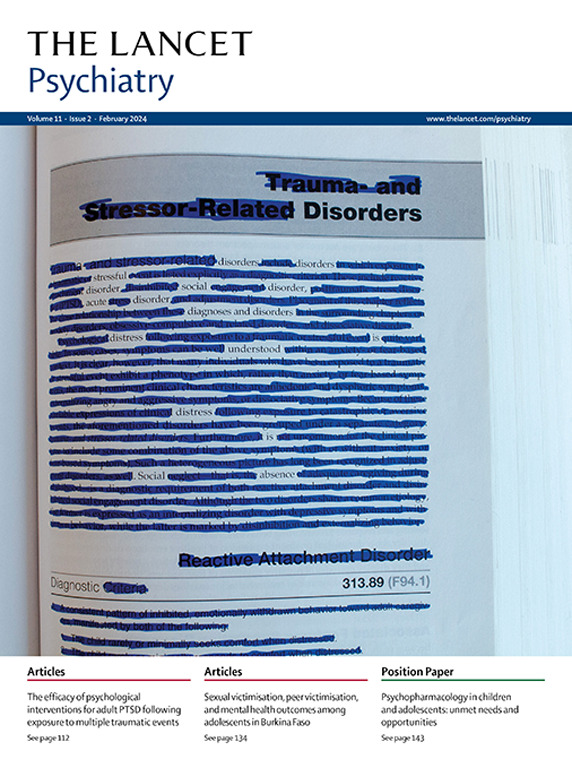Clinical effectiveness of an online psychoeducational and psychotherapeutic programme for caregivers of children newly diagnosed as autistic: a parallel, assessor-masked, randomised controlled trial in the UK (REACH-ASD)
IF 30.8
1区 医学
Q1 PSYCHIATRY
引用次数: 0
Abstract
Background
Caregivers of autistic children experience particularly poor levels of mental health and increased caregiving complexities. Proactive post-diagnostic family support is recommended but is inconsistently implemented, largely not evidence based, and does not directly address caregiver mental health. This study aimed to test the clinical effectiveness of the Empower-Autism programme plus treatment as usual versus the usual local post-diagnostic psychoeducation offer plus treatment as usual on caregiver mental health at the 52-week follow-up.Methods
We did a prospective, multicentre, two-parallel-group, randomised controlled superiority trial of the Empower-Autism programme. Empower-Autism is a group-based, manualised, post-diagnostic programme designed to improve the mental health of caregivers of newly diagnosed autistic children. The programme combines autism psychoeducation and psychotherapeutic components based on Acceptance and Commitment Therapy and was delivered online via videoconferencing. Participants were recruited from 11 North-West England autism diagnostic or intervention centres and were parents or primary caregivers of children aged 2–15 years given an autism diagnosis within the past 12 months. Exclusion criteria were insufficient English language skills, significant learning disability, hearing or visual impairment, or psychiatric condition in caregiver and significant current family safeguarding concerns. Participants were randomly assigned to the intervention or treatment as usual (2:1), stratified by centre. Assessors were masked to group assignment but participants were not. The primary outcome was caregiver mental health assessed by the General Health Questionnaire-30 at 52 weeks. All outcomes were analysed following an intention-to-treat approach using linear mixed models on available cases in the first instance, which resulted in a modified intention-to-treat set due to missing data. Sensitivity analyses on multiply imputed data reflected the full intention-to-treat set. People with lived experience were involved in the trial across all stages. The trial was prospectively registered (ISRCTN 45412843) on Sept 11, 2019, and is complete.Findings
Between Sept 16, 2020 and April 14, 2022, 835 potential participants were referred and screened, 384 provided consent, and 379 caregivers were recruited, 255 of whom were randomly assigned to the intervention group and 124 to the treatment as usual group. 333 (88%) participants were female and 46 (12%) were male, with a mean age of 40·6 years (SD 7·3; range 23–69). 294 (78%) of the 379 caregivers were White British, 18 (5%) were White Other, 12 (3%) were Mixed or of multiple ethnicity, 32 (8%) were Asian or Asian British, 16 (4%) were Black or Black British, six (2%) were from any other ethnic group, and one (<1%) had missing ethnicity data. 267 (70%) index children were male, 111 (29%) were female, and one (<1%) was non-binary or other, with a mean age 8·9 years (SD 3·5; range 2·0–16·0). In the available case analysis set (n=319) reflecting a modified intention-to-treat set due to missing data, participants randomly assigned to Empower-Autism had improved mental health at 52 weeks compared with those randomly assigned to treatment as usual (General Health Questionnaire-30 mean difference –4·95 [95% CI –8·21 to –1·68], p=0·0030). 181 adverse events (116 in the Empower-Autism group and 65 in the treatment as usual group) and 15 serious adverse events (nine in the Empower-Autism group and six in the treatment as usual group) were reported; none were deemed to be related to the study intervention. The most common adverse events concerned significant deteriorations in the mental health of caregiver participants or index children and other serious personal issues potentially affecting caregiver mental health.Interpretation
To our knowledge, this is the first fully powered trial to show a statistically and clinically significant sustained effect on mental health in caregivers of newly diagnosed autistic children. In the context of the considerable clinical need in this area, we recommend the use of the Empower-Autism programme to clinicians and policy makers.Funding
National Institute for Health and Care Research Health Technology Assessment Programme.在线心理教育和心理治疗项目对新诊断为自闭症儿童的护理人员的临床效果:英国一项平行、评估者屏蔽、随机对照试验(REACH-ASD)
自闭症儿童的照料者的心理健康水平特别差,照料的复杂性也增加了。建议积极主动的诊断后家庭支持,但实施不一致,很大程度上没有证据基础,也没有直接解决照顾者的心理健康问题。在52周的随访中,本研究旨在测试授权自闭症项目加常规治疗与通常的当地诊断后心理教育加常规治疗在照顾者心理健康方面的临床效果。方法:我们进行了一项前瞻性、多中心、双平行组、随机对照的赋权自闭症项目优势试验。赋予自闭症权能是一项以群体为基础的手动诊断后规划,旨在改善新诊断的自闭症儿童的照料者的心理健康。该项目结合了自闭症心理教育和基于接受与承诺疗法的心理治疗内容,并通过视频会议在线授课。参与者是从英格兰西北部11个自闭症诊断或干预中心招募的,他们是过去12个月内2-15岁被诊断为自闭症的儿童的父母或主要照顾者。排除标准为:英语语言技能不足、明显的学习障碍、听力或视力障碍、照顾者的精神状况以及当前显著的家庭保障问题。参与者被随机分配到干预组或常规治疗组(2:1),按中心分层。评估员对小组任务是不知情的,而参与者则没有。主要结果是在52周时通过一般健康问卷-30评估照顾者的心理健康。所有结果都按照意向治疗方法进行分析,使用线性混合模型对第一例可用病例进行分析,这导致由于数据缺失而修改了意向治疗集。对多重输入数据的敏感性分析反映了完整的意向治疗集。有生活经验的人参与了所有阶段的试验。该试验于2019年9月11日进行了前瞻性注册(ISRCTN 45412843),目前已经完成。在2020年9月16日至2022年4月14日期间,835名潜在参与者被推荐和筛选,384人提供了同意,并招募了379名护理人员,其中255人被随机分配到干预组,124人被分配到常规治疗组。女性333人(88%),男性46人(12%),平均年龄40.6岁(SD 7.3;范围23 - 69)。379名照护者中,294名(78%)是英国白人,18名(5%)是其他白人,12名(3%)是混血或多种族,32名(8%)是亚洲人或亚裔英国人,16名(4%)是黑人或黑人英国人,6名(2%)来自其他种族,1名(1%)缺少种族数据。男性267例(70%),女性111例(29%),非二元或其他1例(1%),平均年龄8.9岁(SD 3.5;范围2·约·0)。在现有的病例分析集中(n=319),反映了由于缺少数据而修改的意向治疗集,随机分配到赋权-自闭症组的参与者与随机分配到常规治疗组的参与者相比,在52周时心理健康状况有所改善(一般健康问卷-30平均差异- 4.95 [95% CI - 8.21至- 1.68],p= 0.0030)。报告了181例不良事件(授权自闭症组116例,常规治疗组65例)和15例严重不良事件(授权自闭症组9例,常规治疗组6例);没有一个被认为与研究干预有关。最常见的不良事件涉及照顾者参与者或指数儿童心理健康的显著恶化以及其他可能影响照顾者心理健康的严重个人问题。据我们所知,这是第一个完全有力的试验,显示统计和临床显着的持续影响对新诊断的自闭症儿童的照顾者的心理健康。在这一领域大量临床需求的背景下,我们建议临床医生和政策制定者使用赋权自闭症计划。资助国家卫生和保健研究所卫生技术评估方案。
本文章由计算机程序翻译,如有差异,请以英文原文为准。
求助全文
约1分钟内获得全文
求助全文
来源期刊

Lancet Psychiatry
PSYCHIATRY-
CiteScore
58.30
自引率
0.90%
发文量
0
期刊介绍:
The Lancet Psychiatry is a globally renowned and trusted resource for groundbreaking research in the field of psychiatry. We specialize in publishing original studies that contribute to transforming and shedding light on important aspects of psychiatric practice. Our comprehensive coverage extends to diverse topics including psychopharmacology, psychotherapy, and psychosocial approaches that address psychiatric disorders throughout the lifespan. We aim to channel innovative treatments and examine the biological research that forms the foundation of such advancements. Our journal also explores novel service delivery methods and promotes fresh perspectives on mental illness, emphasizing the significant contributions of social psychiatry.
 求助内容:
求助内容: 应助结果提醒方式:
应助结果提醒方式:


